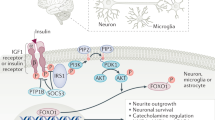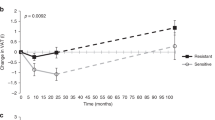Abstract
Insulin is now well established as an adiposity signal that acts in the brain to influence energy homeostasis. It is secreted in direct proportion to adiposity; it enters the brain from the blood, and it interacts with neurons in the ventral hypothalamus. Experimental manipulation of brain insulin causes predictable changes of food intake and body weight. Because insulin shares many properties with other adiposity signals, especially leptin, in this regard, it is important to recognize the similarities and differences in the signal each conveys to the brain in order to design effective therapeutic approaches to treat pathologies of eating and body weight.
This is a preview of subscription content, access via your institution
Access options
Subscribe to this journal
Receive 12 print issues and online access
$259.00 per year
only $21.58 per issue
Buy this article
- Purchase on Springer Link
- Instant access to full article PDF
Prices may be subject to local taxes which are calculated during checkout
Similar content being viewed by others
Author information
Authors and Affiliations
Corresponding author
Rights and permissions
About this article
Cite this article
Woods, S., Seeley, R. Insulin as an adiposity signal. Int J Obes 25 (Suppl 5), S35–S38 (2001). https://doi.org/10.1038/sj.ijo.0801909
Published:
Issue Date:
DOI: https://doi.org/10.1038/sj.ijo.0801909
Keywords
This article is cited by
-
Insulin sensitivity is associated with the observed variation of de novo lipid synthesis and body composition in finishing pigs
Scientific Reports (2022)
-
Insulin detemir attenuates food intake, body weight gain and fat mass gain in diet-induced obese Sprague–Dawley rats
Nutrition & Diabetes (2011)
-
Peripheral satiety signals: view from the Chair
International Journal of Obesity (2009)
-
Sexual Dimorphism in Body Fat Distribution and Risk for Cardiovascular Diseases
Journal of Cardiovascular Translational Research (2009)
-
Insulin Use and Weight Maintenance in Well‐controlled Type 2 Diabetes: A Prospective Cohort Study
Obesity (2008)



